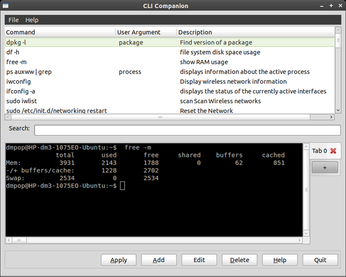Command Line Little Helper: CLI Companion

Productivity Sauce
Whether you are a command line newbie or a proficient terminal user, you'll probably appreciate CLI Companion. This nifty little tool couples the terminal with a database of frequently-used commands. So if you need to execute a specific command, you don't have to type it manually and remember all its parameters. Instead, select the command from the list and hit the Apply button.
CLI Companion comes with a comprehensive list of commands, and you can easily add your own commands to the database. To do this, press the Add button, enter the command in the Command field, and provide an optional description in the Description field. If the command requires user input, specify it in the User Input field. Press OK to save the new entry in the database. By default, custom commands are added at the end of the list, but what if you want to move them at the top? CLI Companion doesn't offer any tools for rearranging entries in the database, there is a simple workaround for this. CLI Companion stores all commands in the ~/.clicompanion text file. Open it in your favorite text editor, and rearrange the commands in the list to your liking.
CLI Companion also provides a handy search feature which can help you to quickly find the command you need. Simply enter the command you want to find in the Search field, and the utility automatically narrows the result as you type.
The CLI Companion project page at Launchpad provides a .deb binary package for Ubuntu and its derivatives. Alternatively, you can add the CLI Companion's PPA and install the utility from it using the following commands:
sudo add-apt-repository ppa:clicompanion-devs/clicompanion-nightlies sudo apt-get update sudo apt-get install clicompanion
Comments
comments powered by DisqusSubscribe to our Linux Newsletters
Find Linux and Open Source Jobs
Subscribe to our ADMIN Newsletters
Support Our Work
Linux Magazine content is made possible with support from readers like you. Please consider contributing when you’ve found an article to be beneficial.

News
-
Keep Android Open
Google has announced that, soon, anyone looking to develop Android apps will have to first register centrally with Google.
-
Kernel 7.0 Now in Testing
Linus Torvalds has announced the first Release Candidate (RC) for the 7.x kernel is available for those who want to test it.
-
Introducing matrixOS, an Immutable Gentoo-Based Linux Distro
It was only a matter of time before a developer decided one of the most challenging Linux distributions needed to be immutable.
-
Chaos Comes to KDE in KaOS
KaOS devs are making a major change to the distribution, and it all comes down to one system.
-
New Linux Botnet Discovered
The SSHStalker botnet uses IRC C2 to control systems via legacy Linux kernel exploits.
-
The Next Linux Kernel Turns 7.0
Linus Torvalds has announced that after Linux kernel 6.19, we'll finally reach the 7.0 iteration stage.
-
Linux From Scratch Drops SysVinit Support
LFS will no longer support SysVinit.
-
LibreOffice 26.2 Now Available
With new features, improvements, and bug fixes, LibreOffice 26.2 delivers a modern, polished office suite without compromise.
-
Linux Kernel Project Releases Project Continuity Document
What happens to Linux when there's no Linus? It's a question many of us have asked over the years, and it seems it's also on the minds of the Linux kernel project.
-
Mecha Systems Introduces Linux Handheld
Mecha Systems has revealed its Mecha Comet, a new handheld computer powered by – you guessed it – Linux.


Other Solution
export PROMPT_COMMAND='history -a;echo -ne "\033]0;${USER}@${HOSTNAME%%.*}:${PWD/$HOME/~}\007"'
export HISTSIZE=500000
CLIcompanion -- more explanation might be helpful
"tasks" that you routinely accomplish with those commands. Often, these tasks are performed at a low frequency and so that associated command often requires re-invention. Features that enable one to store those commands once configured and recall them when needed at a future time, make one's like easier in many ways. I encourage the authors of CLI-Companion to add features to augment shell history features with "helpers". When when tries a new command, CLI-Companion might remember what was tried before and guide the end-user with prompts or questions accompanied with suggestions for suitable command verbs and associated options.
While this article is an informative piece about the existence of CLI-Companion, it might be more valuable if it contained at least one good example of effective use of this interesting tool.
~~~8d;-Dan